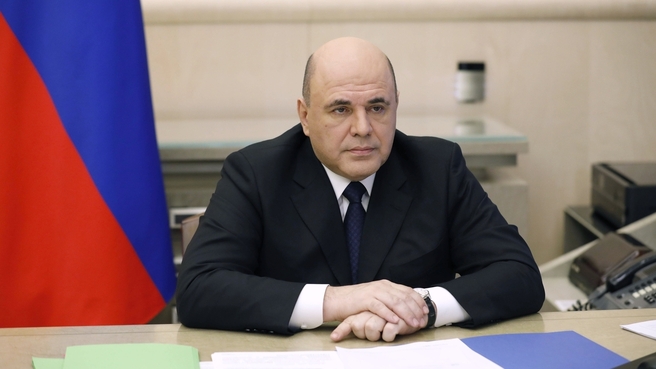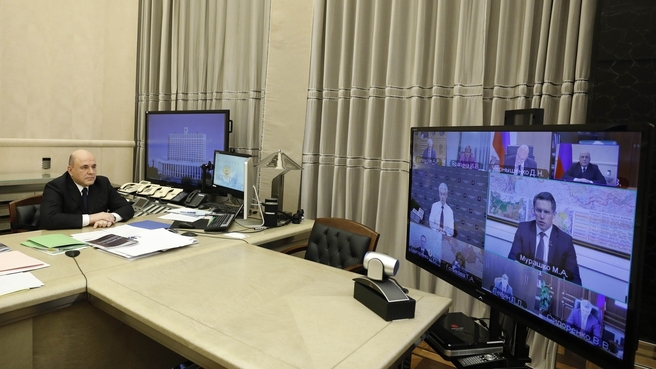The meeting was held via video conference.
Mikhail Mishustin’s opening remarks
Excerpts from the transcript:
Meeting of the Presidium of the Government Coordination Council to control the incidence of the coronavirus in the Russian Federation
Mikhail Mishustin: Good afternoon, colleagues. Yesterday, I reported to the President on the draft national plan to restore jobs and incomes and to promote economic growth and long-term structural changes.
As you are aware, the plan consists of three stages up to the end of 2021. Based on its implementation, we hope not only to overcome the economic recession but also to ensure the GDP’s sustainable growth that will play a major role in increasing incomes. We intend to reach these goals by improving the investment climate, introducing modern technology, enhancing the level of education and also carrying out a number of other measures as well. The President adopted the draft as a foundation for further work. Some aspects should be further discussed. Thus, it is necessary to take into account the results of sectoral meetings that the President will hold over a period of the next few days. The Government will also continue consultations with businesses and the expert community. In addition to this, the President instructed us to draft proposals on specifying the national projects that were affected by the restrictions caused by the spread of the coronavirus infection.
In line with the President’s instruction we must finalise the draft plan. I would like to ask my First Deputy Andrei Belousov and Minister of Economic Development Maxim Reshetnikov to do this job in the near future.
The President also instructed the Government to prepare the proposals on developing and strengthening our national sanitary-epidemiological service. It is the employees of Rospotrebnadzor, sanitary doctors and epidemiologists that were in the forefront of countering the coronavirus infection. They were the first to take the heat. Their prompt reaction to the new threat made it possible to slow down the spread of the virus in this country, to make the process smoother and prevent the exponential growth in the number of infected people, which we saw in some other countries. All arrivals were met at the border by employees of sanitary-quarantine checkpoints. They inspected over 5.4 million people. Like doctors, epidemiologists worked round the clock. Enormous methodological work was carried out by the sanitary-epidemiological service. Every company that continued functioning during the coronavirus epidemic received its recommendations on how to organise their work in order to keep the personnel healthy, or, if a sick employee was identified, how to prevent the spread of the infection. Rospotrebnadzor provided methodological recommendations for almost 700 laboratories throughout the country, including those of the service, medical facilities and the private sector.
Since the very first days of the epidemic, scientists have conducted continuous analytical work on modelling and forecasting the development of the disease. These actions saved lives and the health of many people.
All this has again demonstrated the importance of the sanitary-epidemiological service. Its further development must become a foundation of national biological safety. It is necessary to enhance this service by providing highly skilled personnel and technical equipment and lay emphasis on its scientific aspect. This will make the service even more effective. It must be ready to promptly respond to the most difficult challenges in the future and to protect the lives and health of our people. I am instructing Rospotrebnadzor, the Federal Medical-Biological Agency, the Presidential Property Management Department and other interested federal government bodies to draft and submit to the Government their proposals on developing and strengthening our sanitary-epidemiological service.
There is one more important theme. As we see, the coronavirus situation is gradually improving. This means that we have received an opportunity to start gradually returning back to normal life. This applies to our health system as well. Federal medical facilities that were converted into hospitals for treating coronavirus patients will be able to gradually return to their usual patients with other ailments that they traditionally dealt with. The President spoke about this.
Today, I signed an instruction on closing the hospital stock for treating coronavirus patients in federal and private clinics and on restoring planned medical aid, primarily high-tech aid. This instruction does not concern all clinics for the time being. It applies to those clinics where this is allowed by the epidemiological situation, first of all, a number of federal clinics in Moscow. A relevant decision will be made by the federal ministry or the agency that has founded a given medical facility.
Let’s go over to the discussion of the current issues. I would like to give the floor to Health Minister Mikhail Murashko. He will tell us about the problem that we are continuously monitoring, that is, the payments to those that are now working with coronavirus patients.











